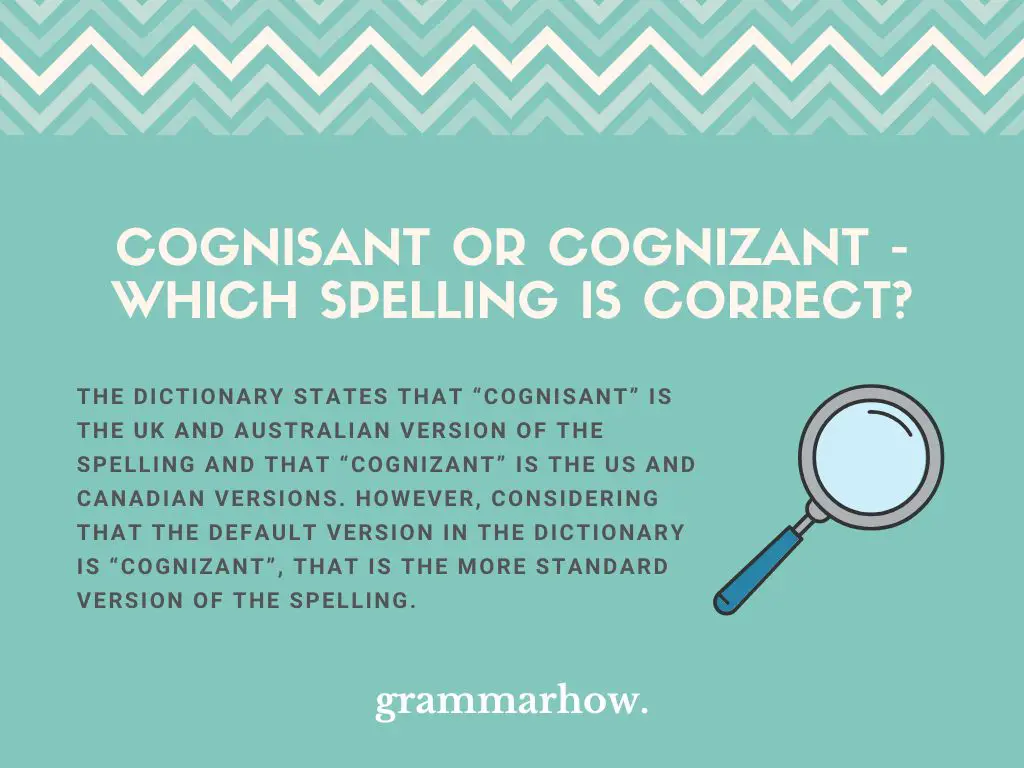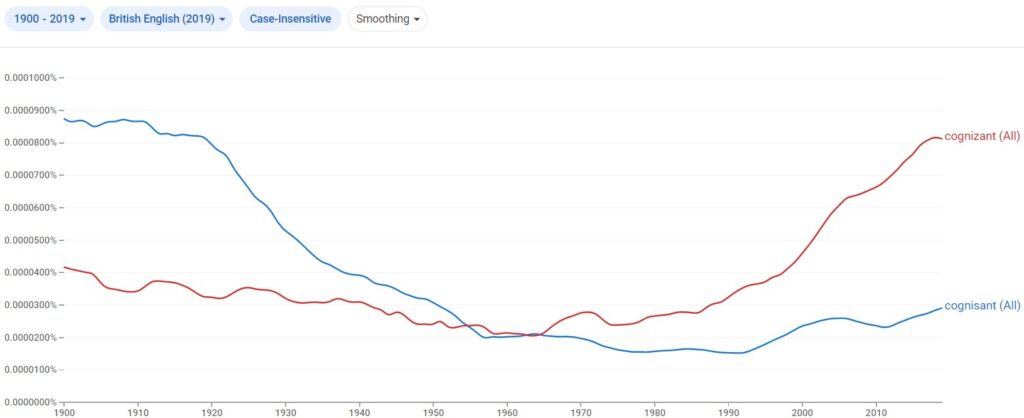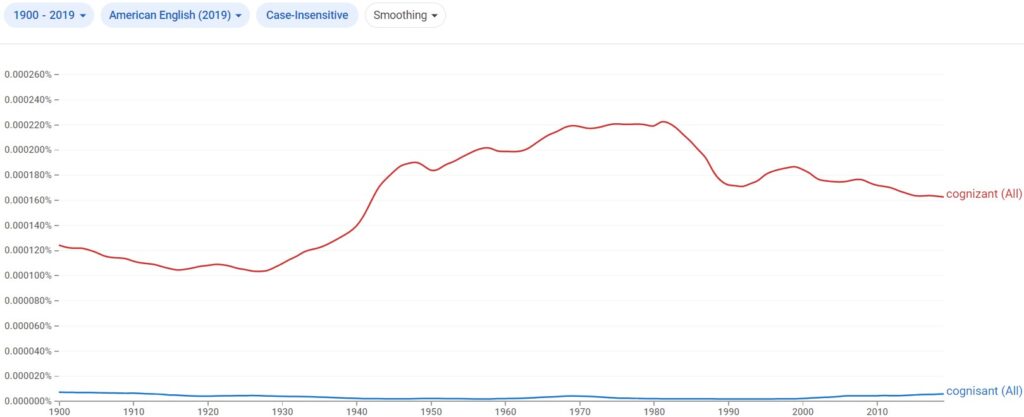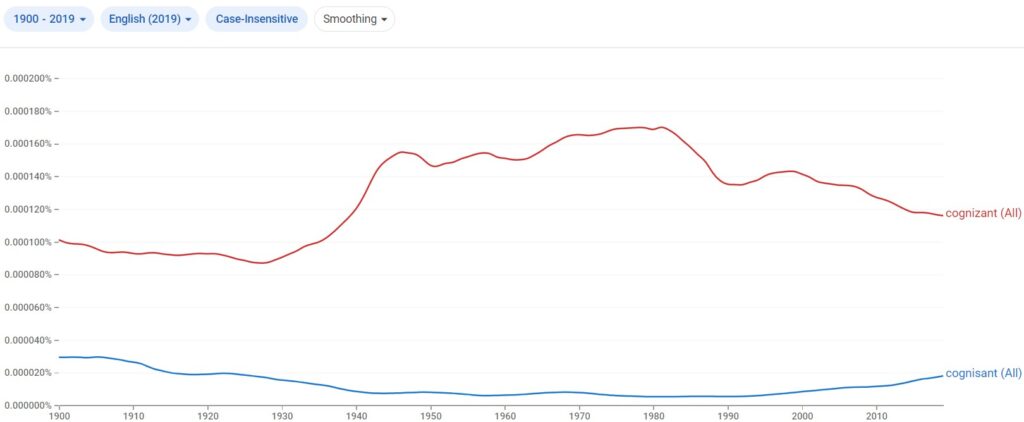In written English, it is common to see both “cognisant” and “cognizant” used to represent the same word. This article examines whether there is a difference between them and how they are used in a sentence.
Cognisant or Cognizant – Which Spelling Is Correct?
The dictionary states that “cognisant” is the UK and Australian version of the spelling and that “cognizant” is the US and Canadian versions. However, considering that the default version in the dictionary is “cognizant”, that is the more standard version of the spelling.

The Cambridge Dictionary explains that “cognisant” is related to the understanding or awareness of something. It lists “cognizant” as the US version and “cognisant” as a UK variant, and the closest synonym to “cognisant” is to be “aware” of something.
While both spelling versions are accepted, “cognizant” is the more common of the two and the standard default spelling in the Cambridge Dictionary, indicating it is the “standard” version.
Here are some examples of “cognisant” in a sentence:
- Most politicians are not cognisant of the struggles of working-class people.
- We ought to be cognisant of the environmental damage caused by eating meat.
- People should be cognisant of their rights, so they do not get exploited.
- Many people are not cognisant of the threat posed by the recession.
- We must be cognisant of our competitors’ activity, so we do not lose market share.
- The defendant was not cognisant of his actions and couldn’t be tried in a criminal court.
- Many sports stars are not cognisant of their achievements until after they reflect on their career in retirement.
Cognisant or Cognizant in the UK?
The Cambridge Dictionary states that “cognisant” is a UK variant of “cognizant.”
The Google Ngram shows that from the start of the 20th century to the 1960s, “cognisant” was more common in the UK than “cognizant.”

However, since the 1960s, as with many other words, “cognizant” has become the preferred version and the use of “cognisant” has been in almost constant decline since the 1920s.
Therefore, in the UK, both versions of the spelling are acceptable and frequent but make sure to be consistent with the version you choose throughout the whole text.
Cognisant or Cognizant in the US?
The default version of the spelling in the Cambridge Dictionary is “cognizant”, indicating that this has become the new “norm” in terms of spelling.
The Google Ngram for American English shows that “cognizant” has always been far more common than “cognisant”, which only saw brief usage in American English at the start of the 20th and 21st centuries.

Therefore in the USA, the standard spelling version is “cognizant.”
Cognisant or Cognizant in Canada?
In Canadian English, the correct spelling of the word is “cognizant”, the same as in the USA. However, there is evidence that some people in Canada do still abide by British spelling, especially on the eastern seaboard, but it is more common to use the American spelling.
Therefore, although both would probably be acceptable, “cognizant” would be the preferred choice in Canadian English.
Cognisant or Cognizant in Australia
The version contained in the Australian Dictionary is “cognisant”, which makes sense considering that Australian English follows British spelling rules.
They do list “cognizant” as an alternative, so it is likely that both are acceptable and used, but “cognisant” appears to be the more standard of the two in Australian English.
Cognisant or Cognizant in Other Countries?
The Google Ngram for global frequency of “cognisant” and “cognizant” shows that “cognizant” has always been more common than “cognisant”, for which the frequency has remained relatively low since the start of the 20th century.

The results of this Ngram, along with the previous ones for the US and UK, indicate that “cognizant” is the more commonly used version of the spelling.
Final Thoughts
In American, British, and Canadian English, the more common and standard spelling choice is “cognizant.” However, in line with general UK spelling rules, “cognisant” is listed in the dictionary as an alternative, less popular British version of the spelling, which is also used in Australia.

Martin holds a Master’s degree in Finance and International Business. He has six years of experience in professional communication with clients, executives, and colleagues. Furthermore, he has teaching experience from Aarhus University. Martin has been featured as an expert in communication and teaching on Forbes and Shopify. Read more about Martin here.
